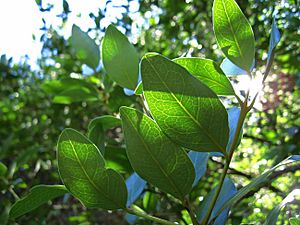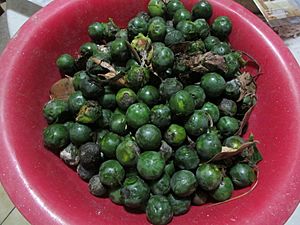Beilschmiedia berteroana facts for kids
Quick facts for kids Beilschmiedia berteroana |
|
|---|---|
 |
|
| Conservation status | |
| Scientific classification |
|
| Kingdom: | Plantae |
| Clade: | Tracheophytes |
| Clade: | Angiosperms |
| Clade: | Magnoliids |
| Order: | Laurales |
| Family: | Lauraceae |
| Genus: | Beilschmiedia |
| Species: |
B. berteroana
|
| Binomial name | |
| Beilschmiedia berteroana (Gay) Kosterm.
|
|
| Script error: The function "autoWithCaption" does not exist. | |
Script error: No such module "Check for conflicting parameters".
Beilschmiedia berteroana is a special evergreen tree. This means it keeps its leaves all year round. It is also known as the southern acorn tree, or belloto del sur in Spanish. This tree is currently threatened, which means it is in danger of disappearing. It belongs to the Lauraceae family, which includes plants like bay laurel. You can find it growing naturally in Chile, a country in South America.
Contents
What the Southern Acorn Tree Looks Like
This tree can grow very tall, up to 30 meters (about 98 feet). Its trunk can be as wide as one meter (about 3 feet). The trunk is straight, and its bark is gray with long cracks.
The leaves are usually opposite each other on the branch. They are shaped like an oval or egg. Their edges are smooth. The top of the leaves is shiny green, and the bottom is a duller, bluish-green. The tip of the leaf is rounded, and the base is slightly wedge-shaped. The leaves are about 3 to 7.5 centimeters long and 2 to 4 centimeters wide. Their stems, called petioles, are covered in soft hairs (pubescent). They are about 2 to 5 millimeters long.
The flowers of the Beilschmiedia berteroana tree have both male and female parts (they are hermaphrodite). They grow in groups called inflorescences, which are about 5 to 6 centimeters long. Each flower is small, about 4 to 6 millimeters, and has a greenish-yellow color.
The fruit is round and green, about 1.5 to 2 centimeters wide. It has a small point at the top. This fruit is a type of drupe, which means it has a fleshy outside and a hard pit inside with a single seed. The fruit is safe to eat!
Where the Southern Acorn Tree Lives
This tree grows in places up to 1800 meters (about 5,900 feet) above sea level. It can handle some cold weather, which is unusual for trees in this mostly tropical plant family.
One important place where you can find this tree is in the La Campana National Park in central Chile. It grows there alongside the Chilean wine palm, another tree that is endangered. The Chilean wine palm used to grow in many more places a long time ago.
How People Use This Tree
The fruit of the Beilschmiedia berteroana is sweet and can be eaten. Local people sometimes eat it. The bark of the tree is useful for tanning leather, which is a way to make animal hides into leather.
This tree is also often planted as an ornamental tree in Chile. This means it is grown for its beauty in gardens and parks. It blooms, or flowers, between July and August in the Southern Hemisphere. Its flowers are used by European bees to make a very tasty honey. The wood from this tree is also very beautiful and strong.
The tree can grow in places with mild winters, similar to USDA zone 9b. It has been planted in Spain and can grow there, but it is not very common to see it outside of Chile.
See also
 In Spanish: Belloto del sur para niños
In Spanish: Belloto del sur para niños
 | Madam C. J. Walker |
 | Janet Emerson Bashen |
 | Annie Turnbo Malone |
 | Maggie L. Walker |



